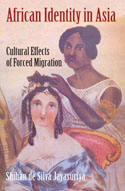 In contrast to the dispersion of slaves across the Atlantic, African movement to Asia has received scant attention because forced migrations across the Red Sea and Indian Ocean, which endured for centuries, were not part of a significant economic network.
In contrast to the dispersion of slaves across the Atlantic, African movement to Asia has received scant attention because forced migrations across the Red Sea and Indian Ocean, which endured for centuries, were not part of a significant economic network.
However, Britain’s 2007 commemoration of the bicentennial of its abolition of the trans-Atlantic slave trade has now stimulated interest in other African migrations.
In a book that encompasses the strong military impact made by even first-generation African migrants in Asia, as well as by the descendants of the royal Africans who governed Sachin and Janjira (India), Shihan de Silva Jayasuriya further demonstrates that African music and dance have not only survived the brutalities of forced migration but have also contributed to the local Middle Eastern and South Asian arts scenes. Even though spirit possession ceremonies have been preserved as a form of cultural identity, new, blended forms of music that evolved in Asia have now become indigenized in the host countries. Forced African migrants have become inadvertent cultural brokers between two continents.
Combining historical accounts, both documented and oral, this groundbreaking work explores — through case studies, and through the processes of assimilation, social mobility, and marginalization — the silent history and conflicting identity of Asia’s Africans.
